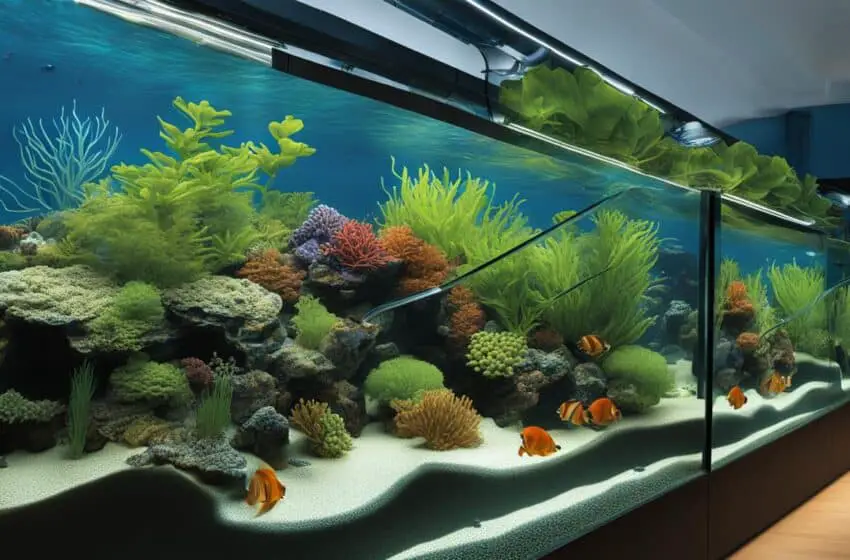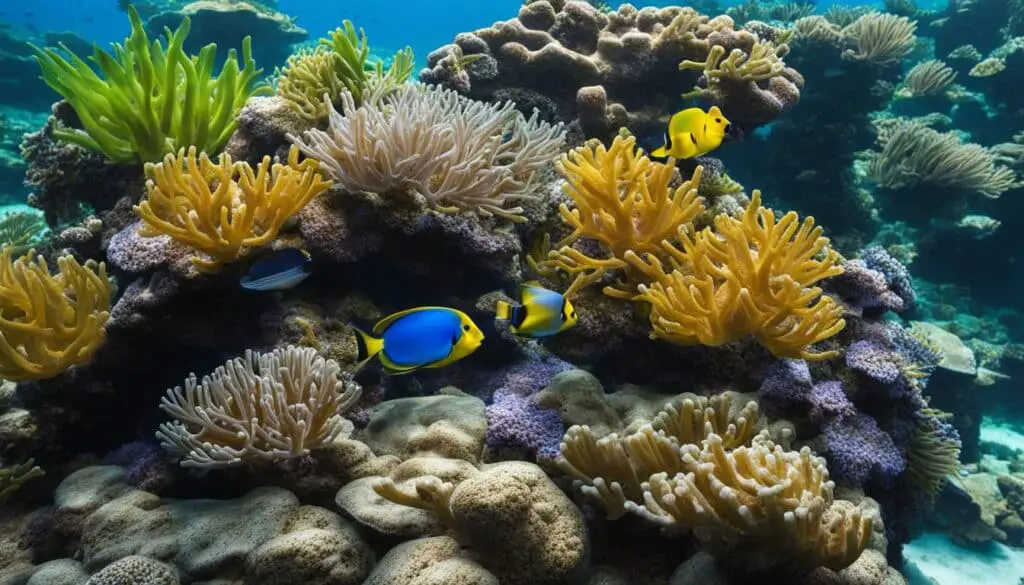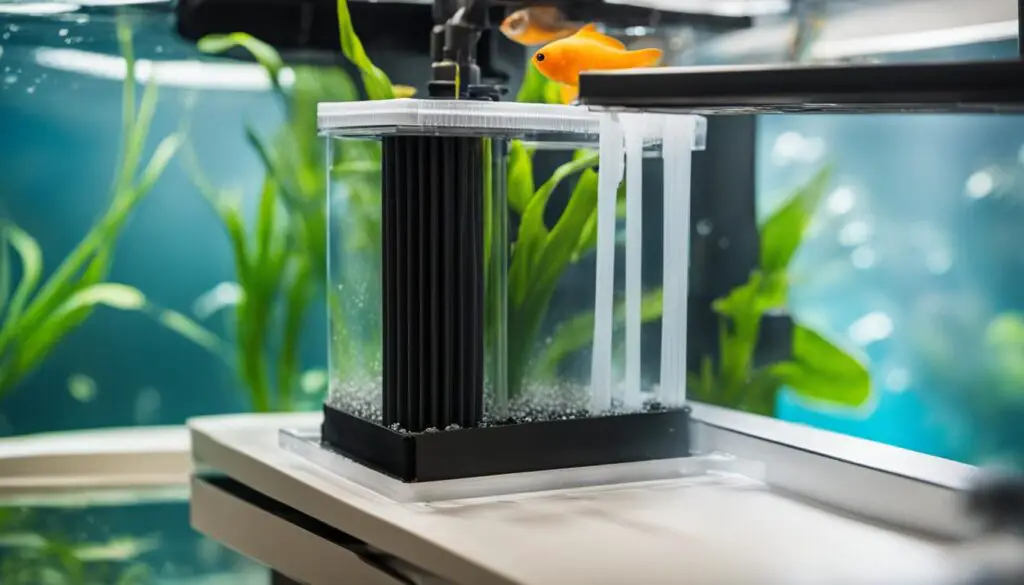Energy-Saving Tips for Maintaining Effective Filtration

Having access to clean and safe water is crucial, not only for the well-being of marine life but also for enthusiasts who appreciate the beauty and complexity of marine aquariums. However, maintaining optimal water quality can be energy-intensive and costly. That’s where energy-efficient marine aquarium filtration systems come into play. These innovative systems not only save money but also benefit the environment by minimizing energy consumption and reducing the carbon footprint.
Key Takeaways:
- Energy-efficient marine aquarium filtration systems help save money and benefit the environment.
- Consider specific water quality needs and select a system that addresses those requirements.
- Look for energy-efficient certifications like ENERGY STAR to ensure optimal efficiency.
- Evaluate different filtration technologies, such as reverse osmosis, to choose the most suitable one.
- Regular maintenance, including filter replacement and system cleaning, is essential for optimal performance and longevity.
Tips for Selecting an Energy-Efficient Marine Aquarium Filtration System
When it comes to choosing a marine aquarium filtration system, it’s essential to consider several factors to ensure optimal performance and energy efficiency. By following these tips, you can select an energy-efficient system that meets your water quality needs while minimizing energy consumption.
Assess Specific Water Quality Needs
To begin, assess your specific water quality needs to determine the filtration system requirements. Consider factors such as contamination levels, types of pollutants, and water hardness. This evaluation will help you choose a system that effectively filters out impurities and maintains optimal water quality.
Look for Energy-Efficient Certifications
When browsing through different filtration systems, keep an eye out for energy-efficient certifications like ENERGY STAR. These certifications indicate that the system has been tested and proven to meet strict energy efficiency standards. By selecting a certified system, you can ensure that your aquarium’s filtration is both effective and environmentally friendly.
Consider Reverse Osmosis Technology
Reverse osmosis is a highly effective technology for removing contaminants from water. It uses a semi-permeable membrane to remove impurities at a microscopic level. While reverse osmosis provides excellent filtration results, it’s important to consider the energy requirements of this technology. Balancing effective filtration with energy consumption is key.
Evaluate Maintenance Requirements
Another crucial aspect to consider is the maintenance requirements of the filtration system. Look for indicators and features that make maintenance easier, such as easily accessible filters and clear monitoring systems. A system that is simple to maintain will save you time and effort in the long run.
Compare Energy Consumption
Lastly, compare the energy consumption of different filtration systems. Look for systems that have energy-saving features built-in, such as energy-efficient motors or adjustable flow rates. These features can significantly reduce energy consumption in the long term, helping you save on electricity costs.
By following these tips, you can confidently choose an energy-efficient marine aquarium filtration system that meets your water quality needs while reducing energy consumption. Remember to assess your specific needs, look for energy-efficient certifications, consider reverse osmosis technology, evaluate maintenance requirements, and compare energy consumption. Selecting the right filtration system will ensure a cleaner and healthier environment for your marine aquarium.
Key Benefits of Energy-Efficient Marine Aquarium Filtration Systems
Energy-efficient marine aquarium filtration systems provide a range of key benefits that make them a smart choice for both the environment and aquarium owners. These systems not only contribute to a cleaner and healthier environment but also offer cost savings and enhanced performance.
Environmental Benefits
- Reduced Carbon Footprint: Energy-efficient filtration systems help to minimize greenhouse gas emissions, making a positive impact on the environment.
- Lower Energy Consumption: By consuming less electricity, these systems play a significant role in conserving energy resources, leading to a cleaner planet.
Cost Savings
- Reduced Utility Bills: Energy-efficient marine aquarium filtration systems are designed to consume less energy, resulting in cost savings for aquarium owners.
- Long-Term Investment: Although energy-efficient systems may have a higher upfront cost, the long-term savings in electricity bills make them a worthwhile investment.
Enhanced Performance
Contrary to popular belief, energy-efficient marine aquarium filtration systems offer enhanced performance compared to traditional systems. These systems are equipped with advanced technologies and features that ensure high-quality water output and optimal filtration efficiency.
“Energy-efficient marine aquarium filtration systems not only provide environmental benefits and cost savings but also excel in performance, delivering cleaner, healthier water for your marine ecosystem.” – Aquarium Expert
By selecting energy-efficient marine aquarium filtration systems, users can enjoy the combined benefits of cost savings, environmental stewardship, and enhanced performance. These systems play a crucial role in creating a sustainable and thriving aquatic environment while minimizing ecological impact.

Essential Maintenance Tips for Energy-Efficient Marine Aquarium Filtration Systems
Regular maintenance is crucial for ensuring the efficiency and longevity of energy-efficient marine aquarium filtration systems. To keep your system running smoothly, follow these essential maintenance tips:
- Regular Filter Replacement: Regularly replace filters to maintain their effectiveness and prevent system clogging. This will ensure optimal filtration performance and keep your water clean and healthy.
- Monitor Water Pressure: Proper water pressure is vital for optimizing system performance. Regularly check and maintain the correct water pressure to prevent any issues and ensure efficient filtration.
- Perform System Cleaning: Regularly clean your filtration system to remove impurities and maintain its efficiency. This includes cleaning filter cartridges, removing debris, and keeping the system free from any obstructions.
- Schedule Professional Maintenance: It’s important to schedule professional maintenance at least once a year. A professional technician can thoroughly inspect and service your system to ensure its optimal performance and identify any potential issues.
By following these essential maintenance tips, you can prolong the lifespan of your energy-efficient marine aquarium filtration system and ensure that it continues to provide clean and safe water for your aquatic environment.

Conclusion
Selecting an energy-efficient marine aquarium filtration system is a smart choice for both cost savings and environmental benefits. By considering your water quality needs, looking for energy-efficient certifications, and evaluating maintenance requirements, you can choose a system that meets your specific requirements.
Regular maintenance is essential for optimal performance and prolonging the lifespan of your filtration system. Remember to periodically replace filters to maintain effectiveness and prevent clogging. Monitor and maintain proper water pressure to ensure optimal system performance. Additionally, perform regular system cleaning to remove impurities and keep your system operating efficiently. Don’t forget to schedule professional maintenance at least once a year to identify potential issues and ensure your system’s optimal performance.
By following these tips and investing in an energy-efficient marine aquarium filtration system, you can enjoy clean and safe water while minimizing energy consumption and reducing your environmental impact. Not only will you save money on electricity bills, but you’ll also contribute to a cleaner and healthier environment. Choose the right system, maintain it properly, and experience the benefits of prolonged lifespan and optimal performance.
FAQ
What factors should I consider when choosing a marine aquarium filtration system?
It is important to assess specific water quality needs, considering factors such as contamination levels, pollutants, and water hardness.
Are there any energy-efficient certifications for marine aquarium filtration systems?
Yes, you can look for energy-efficient certifications like ENERGY STAR to ensure that the filtration system is energy-efficient.
What is reverse osmosis technology and should I consider it for my marine aquarium filtration system?
Reverse osmosis technology is highly effective in removing contaminants. However, it is essential to consider the energy requirements of this technology before making a decision.
How can I maintain the efficiency of my energy-efficient marine aquarium filtration system?
Regularly replace filters, monitor and maintain proper water pressure, and perform regular system cleaning to ensure optimal performance and efficiency.
Why should I choose an energy-efficient marine aquarium filtration system?
Energy-efficient filtration systems not only contribute to a cleaner and healthier environment by reducing carbon footprint and greenhouse gas emissions, but they also result in cost savings by consuming less electricity.



